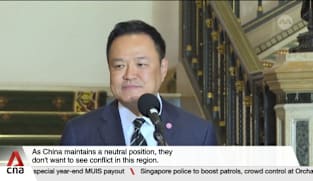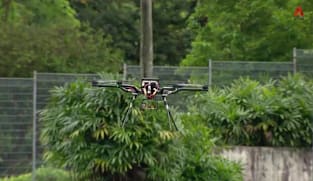Committee of Supply 2023 debate, Day 6: Ong Ye Kung on decisive action on ‘top priorities’ Healthier SG and ageing in communities
A major after-effect of COVID-19 is that it inspired Singapore to accelerate changes to its healthcare system, said Health Minister Ong Ye Kung. Speaking in Parliament on Friday (Mar 3), he said the healthcare system is now at a decisive stage of a major transformation. Singapore is looking at healthcare as three interlinked systems, he said. First, the acute care system, which is mature and well-developed, and treats people who are very sick through hospitals and specialist clinics. Second, the population health system that is in its adolescence, focusing on good health and preventive care through Healthier SG. Third, the aged care system that is in its infancy and still developing towards aged care predominantly in the community. Mr Ong said the imperative for this transformation is Singapore’s rapidly ageing population, and the impetus to act now is COVID-19, which made things that were hitherto impossible to implement possible. “So do not waste a crisis,” he said. On the acute care system, he said Singapore, which has about 11,000 public hospital beds, targets to add 1,900 public hospital beds over the next five years. These will come mainly from Woodlands Health Campus, which will progressively start operations from the end of this year, and Tan Tock Seng Hospital Integrated Care Hub, which will also start operations this year. Turning to the second system, which is for population health, Mr Ong described family doctors as the “lynchpin” of Healthier SG. To boost sign-ups, once the first consultation is completed, 3,000 Healthpoints worth about S$20 will be awarded. Those with high chronic medication needs and bills who enrol with a general practitioner (GP) clinic can opt to get certain drugs at prices comparable to those in polyclinics under a Healthier SG chronic tier. The subsidised and cheaper alternatives used by polyclinics will be made available to these patients through their private GP clinics but they are not compelled to switch, said Mr Ong. Another benefit is the removal of cash co-payment when using MediSave for chronic treatment. Patients can use MediSave to pay their bills fully up to the withdrawal limit. This will be effective from early 2024. Turning to the third system, which is for aged care, Mr Ong said the Government is building more nursing homes and doubling the number of beds from about 16,000 in 2020 to over 31,000 by 2030. What is more important is for seniors to be able to age in their current homes, he said. The Government will need to leverage “two important assets”. One is the use of HDB estates as common spaces for seniors to age healthily in the community. The other is the role of community partners in providing social care and support in the housing estates. The Government has been working with some of them to implement pilot programmes for ageing in communities. It is putting these ground experiences together into an effective operating model for all Active Ageing Centres (AACs) to expand the network. The Ministry of Health is studying how best it can strengthen its support of the AACs, which Mr Ong said is “another major healthcare programme”, alongside Healthier SG. The Government is reviewing its healthcare financing framework to make it more premises-neutral. In the meantime, it will make three smaller moves. In the second half of this year, it will extend the use of MediSave to homebound patients receiving home medical care. It will also normalise telehealth for care delivery and make it part of routine chronic disease management, as well as provide stronger support for palliative care. Mr Ong concluded by stressing Healthier SG and ageing in communities as the top priorities now. “Today, we have, through the crisis of COVID-19 and all that we as a nation have learnt in overcoming it, a powerful impetus to act - decisively, with resolve and extraordinary will to see us through this necessary transformation,” he said.
A major after-effect of COVID-19 is that it inspired Singapore to accelerate changes to its healthcare system, said Health Minister Ong Ye Kung. Speaking in Parliament on Friday (Mar 3), he said the healthcare system is now at a decisive stage of a major transformation. Singapore is looking at healthcare as three interlinked systems, he said. First, the acute care system, which is mature and well-developed, and treats people who are very sick through hospitals and specialist clinics. Second, the population health system that is in its adolescence, focusing on good health and preventive care through Healthier SG. Third, the aged care system that is in its infancy and still developing towards aged care predominantly in the community. Mr Ong said the imperative for this transformation is Singapore’s rapidly ageing population, and the impetus to act now is COVID-19, which made things that were hitherto impossible to implement possible. “So do not waste a crisis,” he said. On the acute care system, he said Singapore, which has about 11,000 public hospital beds, targets to add 1,900 public hospital beds over the next five years. These will come mainly from Woodlands Health Campus, which will progressively start operations from the end of this year, and Tan Tock Seng Hospital Integrated Care Hub, which will also start operations this year. Turning to the second system, which is for population health, Mr Ong described family doctors as the “lynchpin” of Healthier SG. To boost sign-ups, once the first consultation is completed, 3,000 Healthpoints worth about S$20 will be awarded. Those with high chronic medication needs and bills who enrol with a general practitioner (GP) clinic can opt to get certain drugs at prices comparable to those in polyclinics under a Healthier SG chronic tier. The subsidised and cheaper alternatives used by polyclinics will be made available to these patients through their private GP clinics but they are not compelled to switch, said Mr Ong. Another benefit is the removal of cash co-payment when using MediSave for chronic treatment. Patients can use MediSave to pay their bills fully up to the withdrawal limit. This will be effective from early 2024. Turning to the third system, which is for aged care, Mr Ong said the Government is building more nursing homes and doubling the number of beds from about 16,000 in 2020 to over 31,000 by 2030. What is more important is for seniors to be able to age in their current homes, he said. The Government will need to leverage “two important assets”. One is the use of HDB estates as common spaces for seniors to age healthily in the community. The other is the role of community partners in providing social care and support in the housing estates. The Government has been working with some of them to implement pilot programmes for ageing in communities. It is putting these ground experiences together into an effective operating model for all Active Ageing Centres (AACs) to expand the network. The Ministry of Health is studying how best it can strengthen its support of the AACs, which Mr Ong said is “another major healthcare programme”, alongside Healthier SG. The Government is reviewing its healthcare financing framework to make it more premises-neutral. In the meantime, it will make three smaller moves. In the second half of this year, it will extend the use of MediSave to homebound patients receiving home medical care. It will also normalise telehealth for care delivery and make it part of routine chronic disease management, as well as provide stronger support for palliative care. Mr Ong concluded by stressing Healthier SG and ageing in communities as the top priorities now. “Today, we have, through the crisis of COVID-19 and all that we as a nation have learnt in overcoming it, a powerful impetus to act - decisively, with resolve and extraordinary will to see us through this necessary transformation,” he said.



















